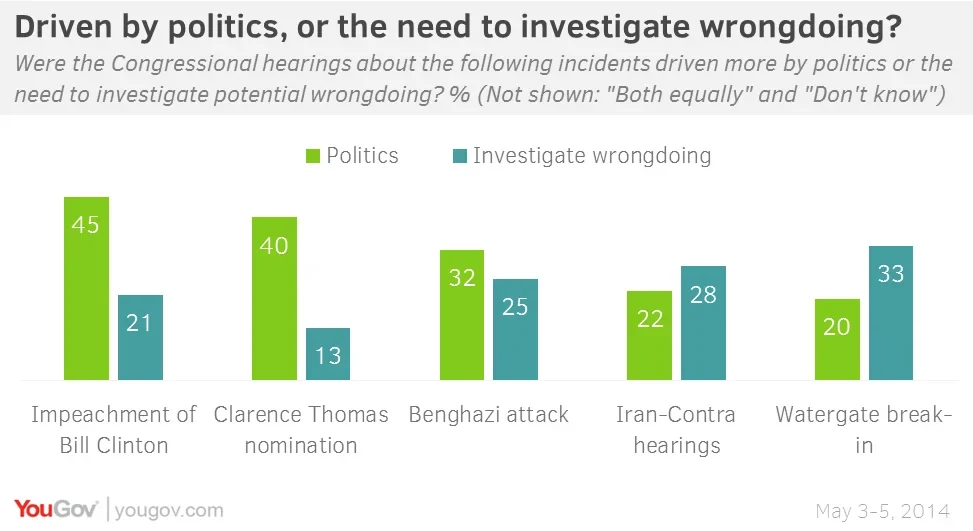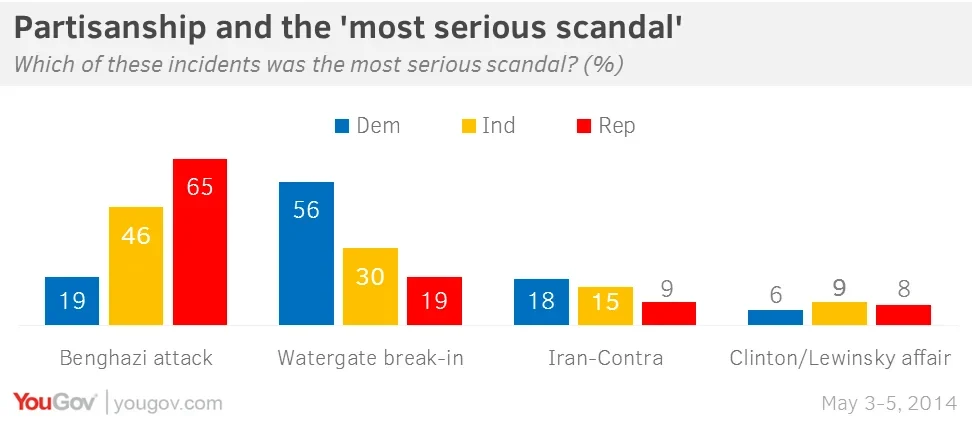While Americans tend to think of the impeachment of Bill Clinton as politically motivated, they are more divided on the nature of investigations into the attacks in Benghazi
In the past week two of the biggest political controversies of the last two decades have both returned to national headlines. House Republicans announced that they would be setting up a select committee on the September 2012 attacks at the American diplomatic mission in Benghazi, and allegations that the Obama Administration politicized early accounts of what took place there. Then Monica Lewinsky broke a decade-long media silence over her affair with President Bill Clinton, writing in Vanity Fair magazine that while her boss “took advantage" of her, the relationship was fully consensual.
Both controversies ultimately pitted Congressional Republicans against Democrats, who accused their colleagues of playing politics, and both have elicited comparisons to the Watergate scandal that led to its own select committee as well as Richard Nixon’s resignation.
But new research from YouGov finds that nearly half of Americans think Bill Clinton’s impeachment by Congress in the aftermath of the Lewinsky affair was driven purely by politics, compared to only a third who say the same for Benghazi.
The 45% who think Clinton’s impeachment was driven by politics alone outstrips the number who say the same for the hearings regarding the Clarence Thomas Supreme Court nomination (40%), the Benghazi attack (32%), Iran-Contra (22%) and the Watergate scandal (20%).

However, it is unclear how perceptions of any controversy will stand the test of time. A Harris poll taken in August 1973 found 46% of people saw Watergate as mostly about politics.
More serious than Watergate?
The poll also finds that many Americans currently consider the controversy surrounding the Benghazi attacks to be more serious than Watergate, though views of scandals are starkly divided along partisan lines. Presented with four scandals that have rocked administrations from both parties over the years, four in ten (42%) Americans say Benghazi is the most serious of all four incidents, edging out Watergate, which is seen as most serious by 35%. Only 15% say Iran-Contra is the most serious while 9% say the same for the Clinton-Lewinsky affair.
Benghazi is also the most polarizing: the gap between the percentages of Republicans who believe Benghazi is the most serious (65%) and the Democrats who agree (19%) is 46 points.

Of course, Benghazi is the only current controversy in the list - the same poll run in ten years time would likely have very different results. A CBS News poll taken in 2005 found that 51% of Americans believed the leaking of CIA agent Valerie Plame’s name to reporters was of “great importance” to the country, nearly on par with the 53% of Americans who said the same of Watergate in a May 1973 Gallup poll. 48% said the same of Iran-Contra in 1987 and 41% of the Clinton-Lewinsky affair in 1998.
Topline results can be found here.
Full tables and demographic crossbreaks can be found here.
Image: Getty








